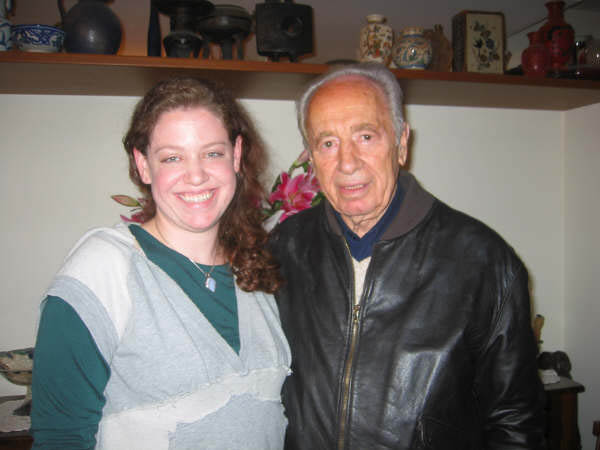
Louis Rose Society Newsletter No. 13
April 11, 2007
Louis Rose Society
for the preservation of Jewish history

Newsletter No. 13
San Diego, Wednesday, April 11, 2007
 |
Louis Rose Society Newsletter No. 13 April 11, 2007 |
|||
|
|
||||
|
|
|
|
In this Issue: |
||||||
|
National and International |
Local and Regional *The Jewish Grapevine *Jews in the News *Filner draws mixed reactions at SDSU *Investing in Jewish day schools |
Ready Reference Jewish Community Calendar San Diego Jewish Directory Advertisement *Gert Thaler Tribute Dinner |
||||
|
___________________________
Azmi Beshara is the best example of an Israeli Arab (or
Israeli Palestinian) who is leading his people to nowhere. He also
demonstrates that higher education, native intelligence, and affiliation
with the Christian community does not assure moderation. Beshara has a
PhD in political science, and is among the most articulate of Knesset
members.
He is also the most outspoken Knesset member in support
of an expansive conception of Palestinian rights. He has traveled to
Syria and Lebanon, appeared along with Hassan Nasrallah and Bashar
al-Assad, and endorsed, by hint or explicitly, the right of Palestinians
and Hezbollah to pursue their claims against Israel with all means,
including violence.
Since his first election to the Knesset in 1996 Beshara
has been a concern of Israeli security and legal authorities. So far the
courts have protected him on the basis of freedom of speech, and the
immunity accorded to Knesset members to express themselves with the
utmost freedom, even on sensitive issues that provoke widespread public
opposition.
Currently Beshara is somewhere, most likely outside of
Israel. There is some kind of legal process in the works, but media
personnel are kept from disclosing its nature on account of a court
order banning publication. Hints and rumors deal with a violation of
security provisions that may entail his arrest, or preventing his
leaving the country, if he returns to Israel. We have heard that he has
sought political refuge in Qatar and has been offered a position as
political commentator on the al-Jazeera network. Some say he intends to
resign from the Knesset, while others deny that report. He may be in
Jordan along with his family, with plans to travel to Europe and India.
Jordan may not be entirely happy with its role in the affair, partly to
avoid friction with Israel, and partly because Beshara has identified
with the Syrian camp in Arab politics. We have also heard that Beshara
has served as a double agent, reporting to Israeli authorities what
transpires in the region, as well as reporting to Syria and Hezbollah on
Israel.
One of the things we argue about is the freedom that
should be allowed to Azmi Beshara and other Israeli Arabs. Authorities,
and especially the courts, are reluctant to curtail their freedom of
speech. Especially sensitive are those who have been elected to the
Knesset, and those who claim to be religious leaders. Along with Beshara
on the borders between the tolerable and the abominable is Raed Salah,
head of the northern branch of Israel's Islamic Movement. In connection
with the recent commotion about the repair of an entrance to the Temple
Mount/Haram esh-Sharif, Salah said, "it is now the duty of every Arab
and Muslim to start an uprising to save Jerusalem and the al-Aqsa
Mosque," and that Israel's Jews "want to build their temple while our
blood is on their clothes, on their doors, in their food and drinks."
Salah does not enjoy a Knesset member's immunity from
prosecution, and he has served time in Israeli prison. Recently a
Jerusalem court ordered his release after the police had arrested him
for incitement to violence. The court refused the police request to
forbid him from entering Jerusalem, but did restrict his public
appearances in the city.
Critics argue that the courts have been more tolerant of
Arab than Jewish extremists. Meir Kahane was forbidden to campaign for
re-election to the Knesset under the law that forbid racist incitement,
while Beshara and Salah have been free to express views no less
inflammatory.
Currently we do not know where Beshara is, whether he is
hiding, seeking refuge from Israeli authorities, inclined to resign from
the Knesset, or to continue his struggle. We also do not know the nature
of the charges against him, but the order forbidding publication is
unlikely to survive the porous nature of Israeli media for much longer.
More important is the problem facing Israel. How much
latitude to allow prominent Israeli Arabs who preach violence, or
endorse those who do? It is the classic question of how should a
democratic society defend itself against those who would use their
freedom of expression to encourage violent change in the regime?
The most complete picture of relations between Israeli
Arabs and Jews appears
in a report by Professor Sammy Smooha, a sociologist and currently
Dean of Social Sciences at the University of Haifa. It portrays a
complex picture that includes distrust, and contrasting assignments of
responsibility between Arabs and Jews. Yet it also shows substantial
sentiment among both populations to support a society that is
integrated, and committed to a peaceful resolution of disputes. Among
its findings is a greater inclination toward comity with Israeli Jews
among Arab citizens than among those in positions of leadership.
This is the best indication that Arab leaders, and most
prominently Azmi Beshara and Raed Salah, have been trying to lead their
people to a place where they have not chosen to go. Those who suffer
most from this road to nowhere are those who follow them, and those
who endure a shortfall in public services because of them.
Arab leaders who would fight the lost battles of 1948
have not
learned the cardinal rules of politics: Get what you can. Cooperation with the dominant parties can achieve benefits for one's voters. Persistent frontal assaults on the regime may serve one's sense of ideological righteousness, but are not likely to increase the food on the table, the quality of education, roads, or health care. 'Friends of IDF' urges San Diegans to attend
SAN DIEGO (Publicity
Release) The IDF Musical Ensemble, the highly talented soldiers that
travel throughout Israel helping to raise the spirit and morale of the
brave young men and women in uniform, are coming to San Diego April 25
to perform one inspiring Yom Ha'Atzmaut Concert! We promise you an
amazing and exciting evening of entertainment at 7:15 p.m. at
Congregation Beth Am, 5050 Del Mar Heights Road.
Israel needs support
for recovering wounded soldiers, the widows and orphans of fallen
soldiers, scholarships, impoverished families, and much more. The first
event of the San Diego Chapter, 3 years ago, was a spectacular show with
the Ensemble that was a sellout with over 600 people. We are lucky to
have them again.
Although tickets will be
available at the door, we highly recommend that you send in your checks
early, and your tickets will be immediately mailed out. (A
self-addressed envelope is appreciated.)
Please call if you have
any questions.
Daniel Brodsky, President
San Diego Chapter,
Friends of the IDF
(858) 794-7018
resolution to prohibit speech criticizing religion IRVINE, Ca. (Publicity Release)—The U.N. Human Rights Council recently passed a resolution urging nations to pass laws prohibiting the dissemination of ideas that "defame religion." It appears that the resolution was partly a response to last year's Danish cartoon crisis, where hordes of angry Muslims rioted in violent protest of cartoons depicting the Prophet Muhammad. "The advocates of this resolution perversely equate those who drew the Danish cartoons with those who rioted and threatened to murder the cartoonists," said Dr. Yaron Brook, executive director of the Ayn Rand Institute. "Both, they say, are guilty of a crime and should be restrained and punished by the government--with the unstated caveat that the cartoonists are guiltier, since they allegedly incited the violent mobs by defaming Islam. "To morally equate the Danish cartoonists with the Muslim rioters is to wipe out the distinction between speech and force. It is to declare there is no essential difference between the filmmaker Theo van Gogh,and the Muslim who murdered him for producing a film that 'defamed Islam.' "Freedom of speech means that individuals have the right to advocate any idea, without the threat of government censorship, regardless of how many people that idea may offend. To silence individuals in order to protect the sensibilities of mullahs and mobs is to wipe out this crucial right--and it is to whitewash the blood-stained hands of killers by declaring that they are no worse than those who peacefully criticize them. "Yet this disgraceful moral equivalence is a symptom of the larger moral equivalence that pervades the U.N. Human Rights Council, which is based on the gross pretense that its members--including belligerent regimes such as Iran and Syria, and oppressive dictatorships such as China and Cuba--are champions of peace and individual rights. As a result, its main function is to provide a forum for thugs and dictators to criticize free nations such as the United States and Israel, while pushing their anti-freedom agendas. "The United States should condemn this resolution--and the
morally corrupt organization that produced it. National Jewish Democratic Council chides WASHINGTON (Publicity Release) – Today, the National Jewish Democratic Council (NJDC) called on Republican presidential candidate Rudolph Giuliani to spend more time educating himself on Iran and Middle East politics. NJDC’s rebuke of the former Mayor comes in light of Giuliani’s comments to a New Hampshire audience that he is unaware whether North Korea or Iran is further along in the development of nuclear weapons. This after boasting about his foreign policy credentials. NJDC, which is deeply troubled by the Iranian threat, has serious concerns about Giuliani’s ability to manage U.S. policy in the region. “In order to offer intelligent proposals for addressing Iran, one ought to be able to speak intelligently about the Iranian threat itself,” said NJDC Executive Director Ira Forman. “With Iran posing such a grave challenge to American policymakers, we can ill afford to have a Commander-in-Chief who doesn’t truly understand the threat.” “At a house party in New Hampshire, Mr. Giuliani suggested that it was unclear which was further along, Iran or North Korea, in the development of a nuclear weapons program,” reported the New York Times. The Times article went on to say that Giuliani then suggested a link between Iran and the September 11 attacks with no substantive evidence other than “they have a similar objective … in their anger at the modern world.” [New York Times, 3/7/07] The editors of Foreign Policy offer this rebuttal to Giuliani: “For the record, North Korea tested a nuclear device on October 9, 2006, while the Iranians have yet to do so. The U.S. intelligence community believes Iran could have a nuclear weapon as early as 2010, but most likely in the time frame of 2012-2015.” [Foreign Policy Blog, 4/9/07] “In the 1976 election, voters punished incumbent President Gerald Ford when he claimed in a debate that there was no Soviet domination of Poland,” continued Forman. “American voters do not want someone who misunderstands geo-politics with a finger on the button. Giuliani is apt to learn this the hard way, if he doesn’t move away from soundbyte politics.” President Ford’s notorious debate
gaffe on Poland has been described as “One of his most famous verbal gaffes
[which] helped Jimmy Carter win the presidency.” From the Associated
Press: “’There is no Soviet domination of Eastern Europe and there never
will be under a Ford administration,’ Ford said during the second
presidential debate in October 1976, still the height of the Cold War. The
audience gasped, but when the moderator gave Ford the opportunity to clarify
his answer, he went on to say that Poland was ‘independent or autonomous.’”
[AP, 12/28/06]
________________________________________________________________
makeup of the two parties' representatives in Congress.
He said in the Republican delegation there are no African Americans, no
Mexican-Americans, one Asian-American, three Cuban-Americans and one
Jewish-American. Additionally there are 20 women. "That's it for diversity,"
he said, going on to describe Republicans as members of a party that is
predominantly white, Christian, and wealthy. SAN DIEGO, CA (publicity release) —Children at San Diego’s three Jewish Day
Schools are benefiting from a $500,000 investment to improve academics and
$22,500 in tuition incentives from the Center for Initiatives in Jewish
Education (CIJE) of the Gruss Monument Life Funds. To explain the academic
enhancements and hold the tuition drawing, Chabad Hebrew Academy, San Diego
Jewish Academy, Soille San Diego Hebrew Day School and CIJE invite the
community to a “Celebration of Academic Excellence,” a free kosher gala
dinner reception on Monday, May 14 at 6:00 p.m. at the Lawrence Family
Jewish Community Center at 4126 Executive Drive in La Jolla.
 Arts in Review by Carol Davis ___________________ Sailor's Song: An enchanting air
Pulitzer- Prize winning playwright John Patrick Shanley’s Sailor’s Song
is making it’s West Coast premiere at The New Village Arts Theatre in
Carlsbad through April 29th. I want to say “run, don’t walk to see this
beautifully captivating evening of theatre.” I want to say leave your
imaginations open to whatever the creative team of this young theatre
company puts before you because I know you will
leave with a feeling Shanley’s Sailor
pulls you right into its spell from the beginning.
The Rich, (Manny Fernandes)
a seaman who had aspirations beyond being a crane operator on a cargo ship,
never made captain. Now he isn’t sure about anything in his life and comes
to this seacoast town to be with his uncle John (Doren Elias) whose wife is
dying of cancer. John is a crusty old salt who sees life as it is while Rich
sees life through music, waltzing and fantasizing, or as some might say
:through rose colored glasses."
The night I attended
the show, it was announced by Executive Director Kristainne Kurner that the
very next day, Monday April 9, construction
_______________________________________  Heather
Zeiden, in Israel as an art therapy instructor for a program in Tsfat,
recently had the pleasure of meeting Former Prime Minister Shimon Peres
during a visit to Tel Aviv. Zeiden, who designed the logo of our Louis
Rose Society for the Preservation of Jewish History, was introduced to Peres
by his son, Yonatan Peres, a frequent visitor to San Diego. Heather
Zeiden, in Israel as an art therapy instructor for a program in Tsfat,
recently had the pleasure of meeting Former Prime Minister Shimon Peres
during a visit to Tel Aviv. Zeiden, who designed the logo of our Louis
Rose Society for the Preservation of Jewish History, was introduced to Peres
by his son, Yonatan Peres, a frequent visitor to San Diego.
------------------------------------------------------------------------------  Jews
in the News
--------------------------------------------------------- Jews
in the News
---------------------------------------------------------News spotters: Dan Brin in Los Angeles, Donald H. Harrison in San Diego., Marsha Sutton in North San Diego County. If you'd like to be a spotter in your California city, please contact Harrison at sdheritage@cox.net. _______________________________________________________________________ *Talk about a role with a challenge! David Ellenstein, artistic director of North County Rep, remembers when he was cast to play Jesus in an Easter production at the Crystal Cathedral. Ruth Marvin Webster told the story in the North County Times of San Diego County. *U.S. Sen. Dianne Feinstein says the campaign for increased funding for stem-cell research will go forward notwithstanding President George Bush's almost certain veto of such legislation. Associated Press reporter David Espo has the story in The San Diego Union-Tribune. *Choreographer John Malashock is among members of the San Diego arts community who believes the large Luce Theatre at the former Naval Training Center should be used to stage performances by arts groups, rather than as the home for a proposed pirate theatre tourist attraction. Maureen Magee has the story in The San Diego Union-Tribune. *Richard Meier, architect of the Getty Center, has been engaged to design an ultra-luxurious condominium complex at the Wilshire Boulevard site of the former Robinson-May Center. Roger Vincent reports in the Los Angeles Times. *Richard Rothschild of the Western Center on Law and Poverty argued in appeals court that county restrictions deny necessary medical treatment to the indigent. Cheryl Clark's story is in The San Diego Union-Tribune. * Record producer Phil Spector suffered a setback in the pre-trial motions stage of his trail for the murder of actress Lana Clarkson. A judge permitted the prosecution to schedule as a witness a fifth woman who says Spector threatened her with a gun. Matt Krasnowski of the Copley News Service has the story in The San Diego Union-Tribune.
---------------------------------------------------------------------------------------------
|
||||||